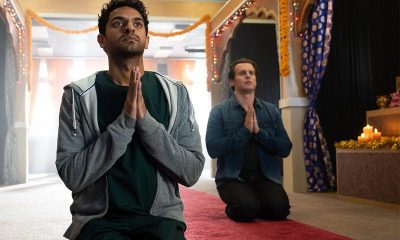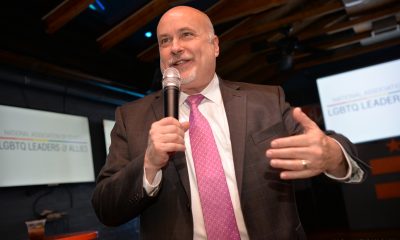a&e features
Pop culture countdown 2014
The top gay moments in film, music, TV and more
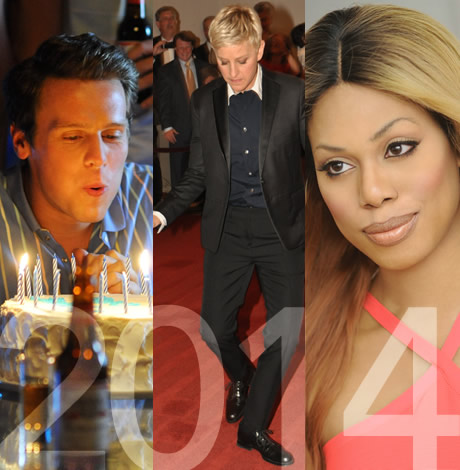
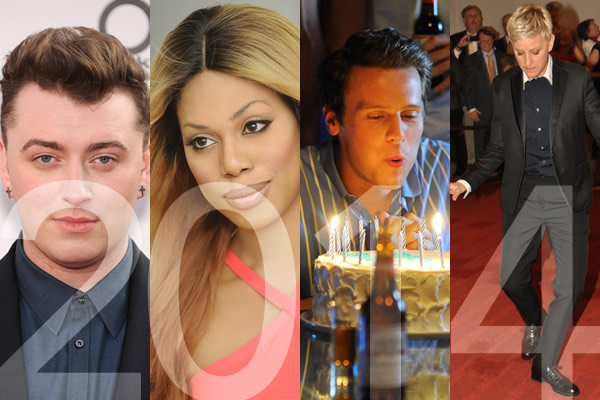
(Photo of Sam Smith courtesy Bigstock; photo of Laverne Cox by Melissa Hamburg; production photo of Jonathan Groff from ‘The Normal Heart’ courtesy HBO; Washington Blade photo of Ellen DeGeneres by Michael Key)
Here is our countdown of the entertainment world’s Top 10 gayest moments of the year:
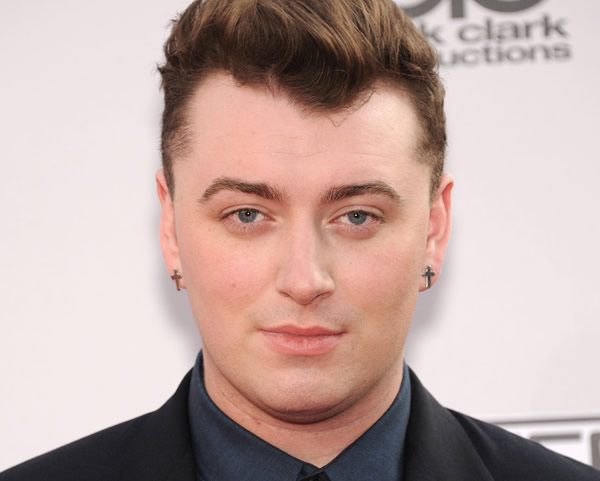
Sam Smith is nominated for six Grammys.
10. Citing powerhouse divas such as Adele, Amy Winehouse, Lady Gaga, Beyonce and more as his influences, it was no huge surprise when British singer Sam Smith came out to E! in May. Known for his work on Disclosure’s “Latch” and Naughty Boy’s “La La La,” the breakout star has had the kind of career aspiring pop singers dream of: his debut studio album “In the Lonely Hour” was an international smash. Last month he found out he’s up for six Grammys. His single “Stay With Me” hit the top 10 in 10 countries.
9. Though stylistically they couldn’t be more diverse, two male country singers came out last year. “What Mattered Most” singer Ty Herndon, 52, a veteran whose first album debuted in 1995, came out in November in a People magazine exclusive in which he referred to himself as an “out, proud and happy gay man.” He’s been married twice previously to women but said he’s been in a relationship with a man in recent years. Former child star Billy Gilman, now 26, rose to fame with his debut album “One Voice,” released in 2000 when he was just 12. Though not nearly as active in recent years — his last album was in 2006 though he had several singles since then — Gilman came out in a video post in November and said he’s gay and is dating.
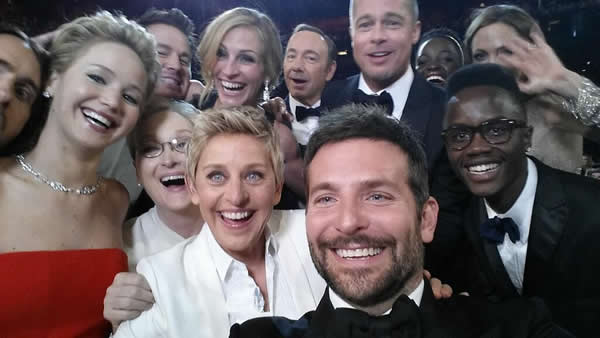
Ellen DeGeneres’s 2014 Oscars selfie is said to be the most re-Tweeted photo ever. (Image courtesy Twitter)
8. Though it drew mixed reviews, Ellen DeGeneres returned — in one of pop culture’s most demanding and thankless jobs — to host the 86th annual Academy Awards in March, her second time at the helm of filmdom’s biggest night. Among her more memorable moments were a “selfie” taken with Julia Roberts, Kevin Spacey, Meryl Streep and several others on the star-studded front row, aping another Hollywood lesbian (the late Billie Burke) when she strode onstage in the famous Glinda gown from “The Wizard of Oz” and, in a rare moment of edgier comedy, suggesting Liza Minnelli, there with her sibs for an “Oz” tribute, was actually a drag queen. Though just slightly miffed, Liza said later she found the joke a little “mean.” “Gravity” was the evening’s big winner but Ellen deserves some of the kudos — it was the most-watched Oscars since 2000.

Neil Patrick Harris (Photo by Angela George; courtesy Wikimedia Commons)
7. It couldn’t have been a bigger or better year for red-hot out jack-of-all-trades Neil Patrick Harris. Not only did he win yet another Emmy for hosting the Tonys this year, he also won a Tony for his lauded turn in the gender-bending “Hedwig and the Angry Inch” on Broadway. He had a deliciously creepy role as Desi in the box office smash movie thriller “Gone Girl,” released his own “choose-your-own-adventure”-type memoir, wed long-time partner David Burtka (with whom he has two kids) in September, wrapped a groundbreaking run playing straight on the sitcom “How I Met Your Mother” and agreed to host the Academy Awards in February. The 41-year-old is widely considered the most successful out actor on the scene today.
6. If Neil Patrick Harris is the most high-profile gay actor, Laverne Cox is undoubtedly the most high-profile transgender actress in Hollywood. Emmy nominated for her role as Sophia on the Netflix smash “Orange is the New Black,” Cox has used her platform to raise awareness of trans issues. The documentary “Laverne Cox Presents: the T Word” aired on MTV and Logo in October. In June, she made history as the first trans person to appear on the cover of Time magazine. In January, Cox had the world’s attention when a clip of her answering a personal question from a clueless Katie Couric was widely shared on social media saying discussions of “transition and surgery objectifies trans people.” Cox told the Blade in October she credits social media with the boon in trans visibility. “[It’s] really given the trans community a platform and a voice and a support that has just reverberated in a different way,” she said.

Joan Rivers died at age 81. (Photo by David Shankbone; courtesy Wikimedia Commons)
5. The gay community suffered a bitter blow when one of its all-time favorites, legendary comedian Joan Rivers, died of cardiac arrest at age 81 during an outpatient throat procedure. She died Sept. 4 after several days in a medically induced coma. Though initially known as a regular on “The Tonight Show” in the ‘60s with Johnny Carson and later her own “Late Show with Joan Rivers,” it was her biting stand-up celebrity-skewering wit and fashion critiques on the red carpets of major award shows that endeared her to a legion of gay fans. In 2013 she declared herself “Queen of the gays” (nobody argued) and she was a long-time advocate of gay causes. “I remember when I was working at the Duplex in Greenwich Village in New York at the beginning of my career,” she told the Advocate, “and the only ones who would laugh at my jokes were the gay guys. I think if I had started out in straight clubs and bars, I never would’ve gotten anywhere.”
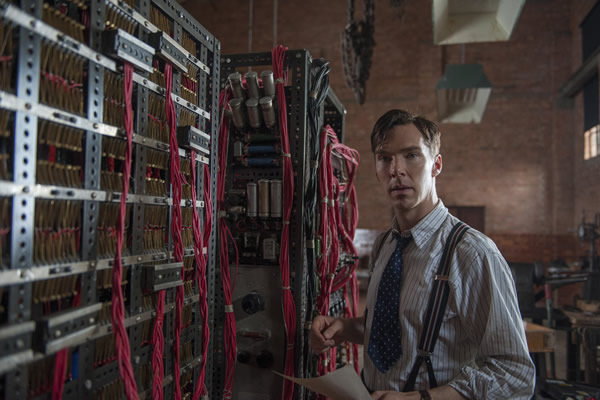
Benedict Cumberbatch as Alan Turing in ‘Imitation Game.’ (Photo courtesy Weinstein Co.)
4. With a Rotten Tomatoes 88 percent positive index, a Time magazine cover story and more than $19 million in box office before it went into wide release in the U.S. (on Christmas Day), “The Imitation Game” was among 2014’s highest profile gay-themed releases. The biopic tells of the late Alan Turing (Benedict Cumberbatch), the gay British WWII-era codebreaker famous for his intellectual brilliance but who had a tragic downfall in an era grossly ignorant of gay rights. Already a critical darling, the film has five nominations pending at the 72nd annual Golden Globe Awards on Jan. 11.

Jonathan Groff stars in HBO’s ‘Looking,’ which returns Jan. 11. (Photo by Mercia Oliveira; courtesy Wikimedia Commons)
3. Although nothing new, LGBT themes continue to have wide representation on new TV shows. “Looking,” an HBO comedy/drama, gained attention for its frank portrayals of the lives of three gay men living in San Francisco. Out actor Jonathan Groff stars as Patrick, a video game designer. The show, which has drawn mixed reviews, returns for a second season Jan. 11. “Transparent,” though initially unveiled in February, debuted its full 10-episode season run in September. Already renewed for a second season, it tells of Mort/Maura (Jeffrey Tambor), a retired professor who comes out as transgender to her family. It’s available through amazon.com.
2. Straight actor Jared Leto culminated an impressive award show streak that included a Golden Globe, an Independent Spirit Award and many more, with an Oscar in the Best Supporting Actor category for playing Rayon, a trans woman with HIV who helps Ron Woodroof (Matthew McConaughey) in his quest to smuggle unapproved AIDS drugs into the country circa 1985. Leto, returning to movies after a five-year hiatus, paid homage to “the 36 million who have lost the battle to AIDS and to those of you who have ever felt injustice for who you are or who you love — tonight I stand here in front of the world with you and for you.”
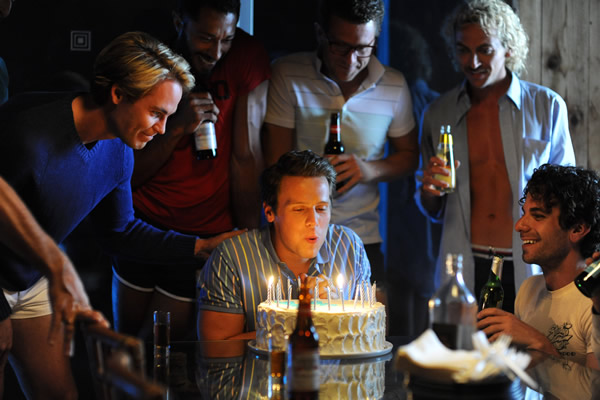
HBO’s ‘Normal Heart’ is nominated for three Golden Globes. (Photo by Jojo Whilden, courtesy HBO)
1. Though earlier efforts languished for various reasons, in May, Larry Kramer’s landmark 1985 play “The Normal Heart” debuted in film version in a star-studded, Ryan Murphy-directed version starring Mark Ruffalo, Jonathan Groff, Matt Bomer, Julia Roberts and more. The blistering work, which tells of a group of gay New York men in the summer of 1981 as AIDS starts its toll, won an Emmy for Outstanding Television Movie in August. Three Golden Globe nominations are pending. Rolling Stone called it “a blunt instrument that is also poetic and profound.” It joins “The Band Played On” and “Angels in America” as among the best AIDS-themed works.
a&e features
Peppermint thrives in the spotlight
In exclusive interview, she talks Netflix show — and the need to resist Trump’s attacks

As an entertainer, there’s not much that Peppermint hasn’t done. She’s a singer, actor, songwriter, reality TV personality, drag queen, podcaster and the list goes on. Most importantly, as an activist she has been an invaluable role model for the trans, queer, and Black communities.
She’s a trailblazer who boasts an impressive list of ‘firsts.’ She is the first out trans contestant to be cast on “RuPaul’s Drag Race” (Season 9). She is the first trans woman to originate a principal musical role for Broadway’s “Head Over Heels.” She was also the first trans woman to compete in the runaway hit series “Traitors,” on Peacock, and she is the ACLU’s first-ever Artist Ambassador for Trans Justice. Her accolades are a true testament of the courage it took for Peppermint to live her authentic self.
We caught up with Peppermint to chat about her activism, taking on bigger roles on screen, our current political and social climate and life beyond the lens. For Peppermint, coming out as trans was not just a moment of strength—it was a necessity.
“It unfolded exactly as I had imagined it in terms of just feeling good and secure about who I am. I was in so much pain and sort of misery and anguish because I wasn’t able to live as free as I wanted to and that I knew that other people do when they just wake up. They get dressed, they walk out the door and they live their lives. Being able to live as your authentic self without fear of being persecuted by other people or by the government is essential to being healthy,” Peppermint tells the Blade in an exclusive interview.
“I was not able to imagine any other life. I remember saying to myself, ‘If I can’t imagine a life where I’m out and free and feeling secure and confident and left alone, then I don’t even want to imagine any kind of a life in the future,’” says Peppermint.
Recently, Peppermint returned for season 2 of Netflix’s comedy “Survival of the Thickest.” She added some spice and kick to the first season in her role as a drag bar owner. This time around, her character moves center stage, as her engagement and wedding become a major plot line in the show. Her expanded role and high-profile trans representation come at just the right time.
“It’s the largest acting role I’ve ever had in a television show, which my acting degree thanks me. It feels right on time, in a day where they’re rolling back trans rights and wanting to reduce DEI and make sure that we are limited from encouraging companies, corporations, industries, and institutions from not only featuring us, but supporting us, or even talking about us, or even referencing us.
“It feels great to have something that we can offer up as resistance. You can try to moralize, but it’s tougher to legislate art. So it feels like this is right on time and I’m just really grateful that they gave me a chance and that they gave my character a chance to tell a greater story.
Peppermint’s expanded role also accompanies a boom in queer representation in Black-powered media. Networks like BET and Starz and producers like Tyler Perry, are now regularly showcasing queer Black folks in main story lines. What does Peppermint think is fueling this increased inclusion?
“Queer folks are not new and queer Black folks are not new and Black folks know that. Every Black person knows at least one person who is queer. We are everywhere. We have not always been at the forefront in a lot of storytelling, that’s true, and that’s the part that’s new. It’s Hollywood taking us from the place where they usually have held us Black, queer folks in the makeup room, or as the prostitute, as an extra—not that there’s anything wrong with sex work or playing a background performer. I’ve played the best of the hookers! But those [roles] are very limiting.
“Hollywood has not historically done and still does not do a very good job of, including the voices of the stories that they make money [on]. And I think they’re realizing [the need] to be inclusive of our stories and our experiences, because for a long time it was just our stories without our actual experiences. It’s also exciting. It’s dramatic. It makes money. And they’re seeing that. So I think they’re just dipping their toes in. I think that they’re going to realize that balance means having us there in the room.”
Peppermint’s activism is tireless. She has raised more than six figures for prominent LGBTQ rights groups, she continues to speak around the nation, appears regularly on major media outlets addressing trans and LGBTQ issues and has been honored by GLAAD, World of Wonder, Out magazine, Variety, Condé Nast and more—all while appearing on screen and onstage in a long list of credits.
Now, under the Trump administration, she doesn’t have time to take a breath.
“I wouldn’t be able to do it if it weren’t second nature for me. Of course, there are ups and downs with being involved with any social issue or conversation and politics. But I am, for now, energized by it. It’s not like I’m energized by like, ‘Ooh, I just love this subject!’ right? It’s like, ‘Oh, we’re still being discriminated against, we gotta go and fight.’
“That’s just what it is. I get energy because I feel like we are quite literally fighting for our lives. I know that is hyperbole in some regards, but they are limiting access to things like housing, healthcare, job security and not having identification. Passport regulations are being put in a blender.”
Peppermint also mentions her thoughts on the unfair mandates to remove trans service members and revoke the rights and resources from the veterans who worked their whole lives to fight for this country.
“When you strip all these things away, it makes it really difficult for people to have a life and I know that that is what they’re doing. When I look around and see that that is what is at stake, I certainly feel like I’m fighting for my life. And that’s energizing.
“The only thing that would be the most rewarding besides waking up in a utopia and suddenly we’re all equal and we’re not discriminating against each other—which probably is not happening this year—is to be able to be involved in a project like this, where we can create that world. It’s also being built by people who are a part of that story in real life and care about it in real life.”
Peppermint is clear on her point that now is the time for all of the letters of the LGBTQ community to come together. Everyone who is trans and queer should be joining the fight against the issues that affect us all.
“Just trust us and understand that our experiences are tied together. That is how and why we are discriminated against in the way[s] that we are. The people who discriminate—just like how they can’t really distinguish between somebody who’s Dominican and somebody who’s African American — you’re Black when you’re getting pulled over. We are discriminated against in much the same way. It’s the same with being trans or queer or gender non-conforming or bi, we all have our own experiences and they should be honored.
“When laws are being created to harm us, we need to band together, because none of y’all asses is gonna be able to stop them from getting rid of marriage equality—which is next. If you roll the tape back to three years ago when somebody was trying to ask me about drag queen bans on readings in school, I was saying they’re coming for trans rights, which comes for bodily autonomy and abortion rights, which comes for gay marriage rights. Those three things will be wiped out.
Peppermint doesn’t take a pause to get fired up and call gay folk out in their obligation to return the favor to the Black trans community.
She shares with us her final thoughts.
“You cis-gender homosexuals need to stand the fuck up and understand that we are standing in front of you. It’s very difficult to understand this and know this, but so many of the rights that we have were hard fought and won by protest and by people fighting very hard for them. And many of those people in every single instance from the suffrage movement, obviously Civil Rights, queer rights, the AIDS and HIV movement—Black queer people have been there the entire time. Trans people have always been a part of that story, including Stonewall. Yes, we are using different terminology. Yes, we have different lenses to view things through, but let me tell you, if you allow us to be sacrificed before you see us go off the side, you will realize that your foot is shackled to our left foot. So, you better stand the fuck up!”
Peppermint for president!
a&e features
Tristan Schukraft on keeping queer spaces thriving
New owner of LA’s Abbey expands holdings to Fire Island, Mexico

LOS ANGELES — Like the chatter about Willy Wonka and his Chocolate Factory, the West Hollywood community here started to whisper about the man who was going to be taking over the world-famous Abbey, a landmark in Los Angeles’s queer nightlife scene. Rumors were put to rest when it was announced that entrepreneur Tristan Schukraft would be taking over the legacy created by Abbey founder David Cooley. All eyes are on him.
For those of us who were there for the re-opening of The Abbey, when the torch was officially passed, all qualms about the new regime went away as it was clear the club was in good hands and that the spirit behind the Abbey would forge on. Cher, Ricky Martin, Bianca del Rio, Jean Smart, and many other celebrities rubbed shoulders with veteran patrons, and the evening was magical and a throwback to the nightclub atmosphere pre-COVID.
The much-talked-about purchase of the Abbey was just the beginning for Schukraft. It was also announced that this business impresario was set to purchase the commercial district of Fire Island, as well as projects launching in Mexico and Puerto Rico. What was he up to? Tristan sat down with the Blade to chat about it all.
“We’re at a time right now when the last generation of LGBT entrepreneurs and founders are all in their 60s and they’re retiring. And if somebody doesn’t come in and buy these places, we’re going to lose our queer spaces.”
Tristan wasn’t looking for more projects, but he recounts what happened in Puerto Rico. The Atlantic Beach Hotel was the gay destination spot and the place to party on Sundays, facing the gay beach. A new owner came in and made it a straight hotel, effectively taking away a place of fellowship and history for the queer community. Thankfully, the property is gay again, now branded as the Tryst and part of Schukraft’s portfolio with locations in Puerto Vallarta and Fire Island.
“If that happens with the Abbey and West Hollywood, it’s like Bloomingdale’s in a mall. It’s kind of like a domino effect. So that’s really what it is all about for me at this point. It has become a passion project, and I think now more than ever, it’s really important.”
Tristan is fortifying spaces for the queer community at a time when the current administration is trying to silence the LGBTQ+ community. The timing is not lost on him.
“I thought my mission was important before, and in the last couple of months, it’s become even more important. I don’t know why there’s this effort to erase us from public life, but we’ve always been here. We’re going to continue to be here, and it brings even more energy and motivation for me to make sure the spaces that I have now and even additional venues are protected going in the future.”
The gay community is not always welcoming to fresh faces and new ideas. Schukraft’s takeover of the Abbey and Fire Island has not come without criticism. Who is this man, and how dare he create a monopoly? As Schukraft knows, there will always be mean girls ready to talk. In his eyes, if someone can come in and preserve and advance spaces for the queer community, why would we oppose that?
“I think the community should be really appreciative. We, as a community, now, more than ever, should stand together in solidarity and not pick each other apart.”
As far as the Abbey is concerned, Schukraft is excited about the changes to come. Being a perfectionist, he wants everything to be aligned, clean, and streamlined. There will be changes made to the DJ and dance booth, making way for a long list of celebrity pop-ups and performances. But his promise to the community is that it will continue to be the place to be, a place for the community to come together, for at least another 33 years.
“We’re going to build on the Abbey’s rich heritage as not only a place to go at night and party but a place to go in the afternoon and have lunch. That’s what David Cooley did that no others did before, is he brought the gay bar outside, and I love that.”
Even with talk of a possible decline in West Hollywood’s nightlife, Schukraft maintains that though the industry may have its challenges, especially since COVID, the Abbey and nightlife will continue to thrive and grow.
“I’m really encouraged by all the new ownership in [nightlife] because we need another generation to continue on. I’d be more concerned if everybody was still in their sixties and not letting go.”
In his opinion, apps like Grindr have not killed nightlife.
“Sometimes you like to order out, and sometimes you like to go out, and sometimes you like to order in, right? There’s nothing that really replaces that real human interaction, and more importantly, as we know, a lot of times our family is our friends, they’re our adopted family.
Sometimes you meet them online, but you really meet them going out to bars and meeting like-minded people. At the Abbey, every now and then, there’s that person who’s kind of building up that courage to go inside and has no wingman, doesn’t have any gay friends. So it’s really important that these spaces are fun, to eat, drink, and party. But they’re really important for the next generation to find their true identity and their new family.”
There has also been criticism that West Hollywood has become elitist and not accessible to everyone in the community. Schukraft believes otherwise. West Hollywood is a varied part of queer nightlife as a whole.
“West Hollywood used to be the only gay neighborhood, and now you’ve got Silver Lake and you’ve got parts of Downtown, which is really good because L.A., is a huge place. It’s nice to have different neighborhoods, and each offers its own flavor and personality.”
Staunch in his belief in his many projects, he is not afraid to talk about hot topics in the community, especially as they pertain to the Abbey. As anyone who goes to the Abbey on a busy night can attest to, the crowd is very diverse and inclusive. Some in the community have started to complain that gay bars are no longer for the gay community, but are succumbing to our straight visitors.
Schukraft explains: “We’re a victim of our own success. I think it’s great that we don’t need to hide in the dark shadows or in a hole-in-the-wall gay bar. I’m happy about the acceptance. I started Tryst Hotels, which is the first gay hotel. We’re not hetero-friendly, we’re not gay-friendly. We’re a gay hotel and everyone is welcome. I think as long as we don’t change our behavior or the environment in general at the Abbey, and if you want to party with us, the more than merrier.”
Schukraft’s message to the community?
“These are kind of dangerous times, right? The rights that we fought for are being taken away and are being challenged. We’re trying to be erased from public life. There could be mean girls, but we, as a community, need to stick together and unite, and make sure those protections and our identity aren’t erased. And even though you’re having a drink at a gay bar, and it seems insignificant, you’re supporting gay businesses and places for the next generation.”
a&e features
Creator Max Mutchnick on inspirations for ‘Mid-Century Modern’
Real-life friendships and loss inform plot of new Hulu show

It’s been a long time – maybe 25 years when “Will & Grace” debuted – since there’s been so much excitement about a new, queer sitcom premiering. “Mid-Century Modern,” which debuted on Hulu last week, is the creation of Max Mutchnick and David Kohan, the gay men who were also behind “Will & Grace.”
Set in Palm Springs, Calif., following the death of the one of their closest friends, three gay men gather to mourn. Swept up in the emotions of the moment, Bunny (Nathan Lane) suggests that Atlanta-based flight attendant Jerry (Matt Bomer) and New York-based fashion editor Arthur (Nathan Lee Graham) move into the mid-century modern home he shares with his mother Sybil (the late Linda Lavin). Over the course of the first season’s 10 episodes, hilarity ensues. That is, except for the episode in which they address Sybil’s passing. The three male leads are all fabulous, and the ensemble cast, including Pamela Adlon as Bunny’s sister Mindy, and the stellar line-up of guest stars, such as Jesse Tyler Ferguson, Vanessa Bayer, Richard Kind, and Cheri Oteri, keep humor buzzing. Shortly before the premiere of “Mid-Century Modern,” Mutchnick made time for an interview with the Blade.
BLADE: I’d like to begin by saying it’s always a delight to speak to a fellow Emerson College alum. In ways would you say that Emerson impacted your professional and creative life?
MAX MUTCHNICK: I think Emerson was the first place that reflected back to me that my voice, my thoughts were good, and they were worth listening to. I developed a confidence at Emerson that did not exist in my body and soul. It was a collection of a lot of things that took place in Boston, but I mean we can just put it all under the Emerson umbrella.
BLADE: Before “Will & Grace,” you co-created the NBC sitcom “Boston Common,” which starred fellow Emerson alum Anthony Clark. Is it important for you to maintain those kinds of alumni relationships?
MUTCHNICK: Because Emersonians are such scrappy little monkeys and they end up being everywhere in the world, you can’t help but work with someone from Emerson at some point in your career. I’m certainly more inclined to engage with someone from Emerson once I learn that they went to my alma mater. For me, it has much more to do with history and loyalty. I don’t think of myself as one of those guys that says, “Loyalty means a lot to me. I’m someone that really leans into history.” It’s just what my life and career turned out to be. The longer I worked with people and the more often I worked with them, the safer that I felt, which means that I was more creative and that’s the name of the game. I’ve got to be as comfortable as possible so I can be as creative as possible. If that means that a person from Emerson is in the room, so be it. (Costume designer) Lori Eskowitz would be the Emerson version. And then (writer and actor) Dan Bucatinsky would be another version. When I’m around them for a long time, that’s when the best stuff comes.
BLADE: Relationships are important. On that subject, your new Hulu sitcom “Mid-Century Modern” is about the longstanding friendship among three friends, Bunny (Nathan Lane), Jerry (Matt Bomer), and Arthur (Nathan Lee Graham). Do you have a friendship like the one shared by these three men?
MUTCHNICK: I’m absolutely engaged in a real version of what we’re projecting on the show. I have that in my life. I cannot say that I’m Jerry in any way, but the one thing that we do have in common is that in my group, I’m the young one. But I think that that’s very common in these families that we create. There’s usually a young one. Our culture is built on learning from our elders. I didn’t have a father growing up, so maybe that made me that much more inclined to seek out older, wiser, funnier, meaner friends. I mean the reason why you’re looking at a mouthful of straight, white teeth is because one of those old bitches sat across from me about 25 years ago at a diner and said, “Girl, your teeth are a disaster, and you need to get that fixed immediately.” What did I know? I was just a kid from Chicago with two nickels in my pocket. But I found three nickels and I went and had new teeth put in my head. But that came from one of my dearest in the group.
BLADE: Do you think that calling “Mid-Century Modern” a gay “Golden Girls” is a fair description?
MUTCHNICK: No. I think the gay “Golden Girls” was really just used as a tool to pitch the show quickly. We have an expression in town, which is “give me the elevator pitch,” because nobody has an attention span. The fastest way you can tell someone what David (Kohan) and I wanted to write, was to say, “It’s gay Golden Girls.” When you say that to somebody, then they say, “OK, sit down now, tell me more.” We did that and then we started to dive into the show and realized pretty quickly that it’s not the gay “Golden Girls.” No disrespect to the “Golden Girls.” It’s a masterpiece.
BLADE: “Mid-Century Modern” is set in Palm Springs. I’m based in Fort Lauderdale, a few blocks south of Wilton Manors, and I was wondering if that gay enclave was ever in consideration for the setting, or was it always going to be in Palm Springs?
MUTCHNICK: You just asked a really incredible question! Because, during COVID, Matt Bomer and I used to walk, because we live close by. We had a little walking group of a few gay gentlemen. On one of those walks, Matt proposed a comedy set in Wilton Manors. He said it would be great to title the show “Wilton Manors.” I will tell you that in the building blocks of what got us to “Mid-Century Modern,” Wilton Manors, and that suggestion from Matt Bomer on our COVID walks, was part of it.
BLADE: Is Sybil, played by the late Linda Lavin, modeled after a mother you know?
MUTCHNICK: Rhea Kohan (mother of David and Jenji). When we met with Linda for the first time over Zoom, when she was abroad, David and I explained to her that this was all based on Rhea Kohan. In fact, some of the lines that she (Sybil) speaks in the pilot are the words that Jenji Kohan spoke about her mother in her eulogy at the funeral because it really summed up what the character was all about. Yes, it’s very much based on someone.
BLADE: The Donny Osmond jokes in the second episode of “Mid-Century Modern” reminded me of the Barry Manilow “fanilows” on “Will & Grace.” Do you know if Donny is aware that he’s featured in the show?
MUTCHNICK: I don’t. To tell you the truth, the “fanilow” episode was written when I was not on the show. I was on a forced hiatus, thanks to Jeff Zucker. That was a show that I was not part of. We don’t really work that way. The Donny Osmond thing came more from Matt’s character being a Mormon, and also one of the writers. It’s very important to mention that the writing room at “Mid-Century Modern,” is (made up of) wonderful and diverse and colorful incredible humans – one of them is an old, white, Irish guy named Don Roos who’s brilliant…
BLADE: …he’s Dan Bucatinsky’s husband.
MUTCHNICK: Right! Dan is also part of the writing room. But I believe it was Don who had a thing for Donny, and that’s where it comes from. I don’t know if Donny has any awareness. The only thing I care about when we turn in an episode like that is I just want to hear from legal that we’re approved.
BLADE: “Mid-Century Modern” also includes opportunities for the singers in the cast. Linda Lavin sang the Jerome Kern/Ira Gershwin tune “Long Ago (And Far Away)” and Nathan Lane and the guys sang “He Had It Coming” from “Chicago.” Was it important to give them the chance to exercise those muscles?
MUTCHNICK: I don’t think it was. I think it really is just the managers’ choice. David Kohan and I like that kind of stuff, so we write that kind of stuff. But by no means was there an edict to write that. We know what our cast is capable of, and we will absolutely exploit that if we’re lucky enough to have a second season. I have a funky relationship with the song “Long Ago (And Far Away).” It doesn’t float my boat, but everybody else loved it. We run a meritocracy, and the best idea will out. That’s how that song ended up being in the show. I far prefer the recording of Linda singing “I’ll Be Seeing You” over her montage in episode eight, “Here’s To You, Mrs. Schneiderman.” We were just lucky that Linda had recorded that. That recording was something that she had done and sent to somebody during COVID because she was held up in her apartment. That’s what motivated her to make that video and send it. That’s how we were able to use that audio.
BLADE: Being on a streaming service like Hulu allows for characters to say things they might not get away with on network TV, including a foreskin joke, as well as Sybil’s propensity for cursing.
MUTCHNICK: And the third line in the show is about him looking like a “reluctant bottom.” I don’t think that’s something you’re going to see on ABC anytime soon. David and I liked the opportunity to open up the language of this show because it might possibly open the door to bringing people…I’m going to mix metaphors…into the tent that have never been there before. A generation that writes off a sitcom because that language and that type of comedy isn’t the way that they sound. One of the gifts of doing this show on Hulu is that we get to write dialogue that sounds a little bit more like you and I sound. As always, we don’t want to do anything just to do it.
BLADE: It didn’t feel that way.
MUTCHNICK: It’s there when it’s right. [Laughs] I want to have a shirt made with Linda’s line, as her mother always used to say, “Time is a cunt.”
BLADE: “Mid-Century Modern” also utilizes a lot of Jewish humor. How important is it for you to include that at this time when there is a measurable rise in anti-Semitism?
MUTCHNICK: I think it’s important, but I don’t think it’s the reason why we did it. We tried very hard to not write from a place of teaching or preaching. We really are just writing about the stuff that makes us laugh. One of the things that makes something better and something that you can invest in is if it’s more specific. We’re creating a character whose name is Bunny Schneiderman and his mother’s name is Sybil and they made their money in a family-run business, it gets Jewy, and we’re not going to shy away from it. But we’re definitely not going to address what’s going on in the world. That doesn’t mean I don’t find it very upsetting, but I’m writing always from the point of view of entertaining the largest number of people that I can every week.
BLADE: “Mid-Century Modern” has a fantastic roster of guest stars including Jesse Tyler Ferguson, Vanessa Bayer, Billie Lourd, Cheri Oteri, Richard Kind, Rhea Perlman, and Judd Hirsch. Are there plans to continue that in future seasons?
MUTCHNICK: Yes. As I keep saying, if we’re so lucky that we get to continue, I don’t want to do “The Love Boat.” Those are fine comic actors, so I don’t think it feels like that. But if we get to keep going, what I want to do is broaden the world because that gives us more to write about. I want to start to introduce characters that are auxiliary to the individuals. I want to start to meet Arthur’s family, so we can return to people. I want to introduce other neighbors, and different types of gay men because we come in so many different flavors. I think that we should do that only because I’m sure it’s what your life is and it’s what my life is. I’ve got a lot of different types. So, yes, we will be doing more.
BLADE: Finally, Linda Lavin passed away in December 2024, and in a later episode, the subject of her character Sybil’s passing is handled sensitively, including the humorous parts.
MUTCHNICK: We knew we had a tall order. We suffered an incredible loss in the middle of making this comedy. One of the reasons why I think this show works is because we are surrounded by a lot of really talented people. Jim Burrows and Ryan Murphy, to name two. Ryan played a very big role in telling us that it was important that we address this, that we address it immediately. That we show the world and the show goes on. That wasn’t my instinct because I was so inside the grief of losing a friend, because she really was. It wasn’t like one of those showbizzy-type relationships. And this is who she was, by the way, to everybody at the show. It was the way that we decided to go. Let’s write this now. Let’s not put this at the end of the season. Let’s not satellite her in. Let’s not “Darren Stevens” the character, which is something we would never do. The other thing that Jim Burrows made very clear to us was the import of the comedy. You have to write something that starts exactly in the place that these shows start. A set comedy piece that takes place in the kitchen. Because for David and me, as writers, we said we just want to tell the truth. That’s what we want to do with this episode and that’s the way that this will probably go best for us. The way that we’ve dealt with grief in our lives is with humor. That is the way that we framed writing this episode. We wanted it to be a chapter from our lives, and how we experience this loss and how we recover and move on.
-

 District of Columbia4 days ago
District of Columbia4 days agoFinal push to raise funds, fill D.C. hotels as WorldPride nears
-

 El Salvador2 days ago
El Salvador2 days agoGay Venezuelan makeup artist remains in El Salvador mega prison
-

 District of Columbia4 days ago
District of Columbia4 days agoReenactment of 1965 gay rights protest at White House set for April 17
-

 Maryland4 days ago
Maryland4 days agoFreeState Justice: Transgender activist ‘hijacked’ Moore’s Transgender Day of Visibility event

